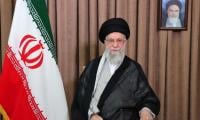PTI’s strategic void
By distancing itself from judiciary’s future, party is retreating into its favoured tactic of confrontation
The decision by the PTI to boycott the Special Parliamentary Committee meeting on the nomination of the next chief justice of Pakistan (CJP) reflects a broader pattern of political disengagement and confusion. By distancing itself from a pivotal moment in the judiciary’s future, the party is yet again retreating into its favoured tactic of confrontation and agitation, rather than engaging in parliamentary processes that could have given it a voice in shaping the judiciary. The 26th Amendment, which introduced a new process for appointing the CJP, has been met with controversy, with the PTI opting to label the amendment as an attempt at undermining judicial independence. Yet this position stands in sharp contrast to the fact that some PTI leaders were initially part of the committee. Political observers have been quick to criticise the PTI’s boycott, which could very well be a strategic blunder, particularly at a time when the odds are already stacked in favour of the government’s choice. Perhaps the PTI, instead of consistently crying foul, should have leveraged this opportunity to exert influence over the nomination process, despite its reservations. By not showing up, the party keeps alienating itself from the legislative process – choosing chaos over constructive engagement.
More troubling is the inconsistency. The constant flip-flopping only adds to the confusion surrounding the party’s strategy. For a party that claims to prioritise rule of law, its reluctance to participate in the processes that make up democratic institutions is both puzzling and self-defeating. Observers have long marveled – rightly so – at the PTI’s ability to spin narratives, a skill that has distinguished the party and bolstered its populist politics. But narrative alone cannot sustain a political movement, especially one that claims to champion institutional reforms. The PTI needs to understand that street agitation and rhetoric have their limits. Eventually, chaos must give way to order, and strategy must replace slogans. Without Imran Khan at the helm, the PTI’s leadership appears rudderless like a headless chicken unsure of its next move. Some argue that this confusion is a direct result of Imran’s leadership style, where decisions are centralised to such an extent that no one dares act independently. During Imran’s incommunicado status, the resulting vacuum within the PTI only deepened the party’s confusion about the amendments and its role in the process.
The reality is that the party is in desperate need of a political strategy. Relying on its narrative and populist appeal will not suffice in the long run. If it continues to shy away from owning political decisions and engaging with the parliamentary process, it will only undermine its own relevance. For a party that once promised to bring about institutional reform and political accountability, such missteps are not only unfortunate but damaging to the very cause it claims to champion. The PTI must now decide whether it wants to remain a party of street protests or evolve into a mature political force capable of navigating the complexities of governance and lawmaking. The boycott of the CJP nomination process was a missed opportunity, and if the PTI continues down this path, it risks alienating not just its supporters, but the very democratic principles it claims to uphold.
-
 New Observatory Sends 800,000 Asteroid Alerts In One Night
New Observatory Sends 800,000 Asteroid Alerts In One Night -
 Cher’s Son Elijah Blue Allman Apprehended On Two Counts Of Assault At Elite Prep School
Cher’s Son Elijah Blue Allman Apprehended On Two Counts Of Assault At Elite Prep School -
 Beatrice, Eugenie Now Face Andrew, Sarah's ‘nightmares’: 'They're Hugely Conflicted'
Beatrice, Eugenie Now Face Andrew, Sarah's ‘nightmares’: 'They're Hugely Conflicted' -
 X Debuts Topic Filtering To Help Users Shape Their ‘For You’ Recommendations
X Debuts Topic Filtering To Help Users Shape Their ‘For You’ Recommendations -
 Scientists Built World's First Computer That Learns Like Human Brain
Scientists Built World's First Computer That Learns Like Human Brain -
 Robert Carradine’s Daughter Makes Bombshell Confession As Actor's Death Cause Confirmed
Robert Carradine’s Daughter Makes Bombshell Confession As Actor's Death Cause Confirmed -
 Beatrice, Eugenie Put On Blast: ‘Only Nitwits Wouldn’t See An Association With A Pedophile As Toxic’
Beatrice, Eugenie Put On Blast: ‘Only Nitwits Wouldn’t See An Association With A Pedophile As Toxic’ -
 OpenAI Defies Industry Pressure, Secures Guardrails Under New US Defense Department Pact
OpenAI Defies Industry Pressure, Secures Guardrails Under New US Defense Department Pact -
 'Sinners' Delroy Lindo Breaks Silence On BAFTA's Tourette’s Incident At NAACP Image Awards
'Sinners' Delroy Lindo Breaks Silence On BAFTA's Tourette’s Incident At NAACP Image Awards -
 Billy Joel Admits Cancelling Of Tour Due To Brain Disorder 'sounds A Lot Worse' Than It Is
Billy Joel Admits Cancelling Of Tour Due To Brain Disorder 'sounds A Lot Worse' Than It Is -
 US And Israeli Strikes On Iran: Everything You Need To Know
US And Israeli Strikes On Iran: Everything You Need To Know -
 US Strikes On Iran Ignite Emergency Push For Powers Legislation: Report
US Strikes On Iran Ignite Emergency Push For Powers Legislation: Report -
 Kelly Osbourne's Mom Sharon Receives 'shut Up' Call Accepting An Award For Late Hubby?
Kelly Osbourne's Mom Sharon Receives 'shut Up' Call Accepting An Award For Late Hubby? -
 Claude Overtakes ChatGPT On Apple App Store After Pentagon Dispute
Claude Overtakes ChatGPT On Apple App Store After Pentagon Dispute -
 What Happened To Ayatollah Ali Khamenei's Family During US -Israel Attack On Iran
What Happened To Ayatollah Ali Khamenei's Family During US -Israel Attack On Iran -
 BRIT Awards 2026 Winners Revealed
BRIT Awards 2026 Winners Revealed




